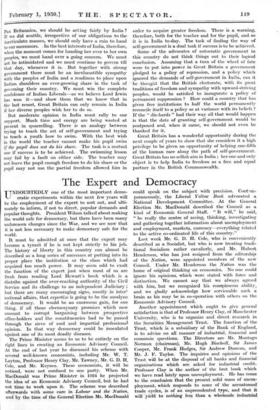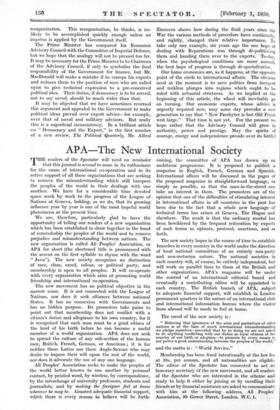The Expert and Democracy
UNDOUBTEDLY one of the most important demo- cratic experiments within the next few years will be the employment of the expert to sort out, and ulti- mately to inform, if not to direct, popular demands and popular thoughts. President Wilson talked about making the world safe for democracy, but there have been many unforeseen changes since the War, and we see now that it is not less necessary to make democracy safe for the world.
It must be admitted at once that the expert may become a tyrarit if he is not kept strictly to his job. The history of liberty .in this country can almost be described as' a long series of successes at putting into its proper place the institution or the olass which had acquired too much power. It may seem odd to exalt the function of the expert just when most of us are fresh from reading Lord Hewart's book which . is a diatribe against the over-reaching authority, of the Civil Service and its challenge to an independent Judiciary ; but there are many encouraging signs, mostly in inter national affairs, that expertize is going to be the anodyne of democracy. It would be an enormous gain, for one thing, if all those eleemosynary promises which now amount to corrupt bargaining between 1 Prospective office-holders and the constituencies had to be Passed through the sieve of cool 'and impartial professional opinion. In that way democracy could be inoculated against one of its most deadly diseases.
The Prime Minister seems to us to be entirely on the right linei in creating an Economic Advisory Council. At the end of last year he discussed' his scheme with several well-known economists, including Mr. W. T. Layton, Professor Henry Clay, Mr. Tawney, Mr. G. D. H. Cole, and Mr. Keynes. These economists, it will be noticed, were not confined to one party. When Mr. MacDonald was Prime Minister in 1924 he projected the idea of an Economic Advisory Council, but he had not time to work upon it. The scheme was described afterwards with some care in Labour and the Nation, and by the time of the General `Election Mr. MacDonald could speak on the subject with precision. Contnn- poraneously, the Liberal Yellow Book advocated a National Development Committee. At the General Election Mr. MacDonald described the Council as a kind of Economic General Staff. " It will," he said, " be really the centre of seeing, thinking, investigating and gathering together information about unemployment and employment, markets, currency—everything related to the active co-ordinated life of this country."
Last week Mr. G. D. H. Cole, who is conveniently described as a Socialist, but who is now treating tradi- tional Socialism rather cavalierly, and Mr. Hubert Henderson, who has just resigned from the editorship of the Nation, were appointed members of the new Council. Under Mr. Henderson the Nation was the home of original thinking on economics. No one could ignore his opinions, which were stated with force and distinction. We cannot say that we always agreed with him, but we recognized his conspicuous ability, and we gladly acknowledge how serviceable such a brain as his may be in co-operation with others on the Economic Advisory Council.
Another appointment which ought to give general satisfaction is that of Professor Henry Clay, of Manchester University, who is to organize and direct research in the Securities Management Trust. The function of the Trust, which is a subsidiary of the Bank of England, is to advise on all manner of industrial, financial and economic questions. The Directors are Mr. Montagu Norman (chairman), Mr. Hugh Bischoff, Sir James Cooper, Mr. Frank Hodges, Sir Andrew Duncan, and Mr. J. F. Taylor. The inquiries and opinions of the Trust will be at the disposal of all banks and financial organizations which are asked for industrial credit. Professor Clay is the author of the best book which we have read lately upon unemployment. He has come to the conclusion that the present solid mass of unem- ployment, which responds to none of the accustomed trade cycles, is of an unprecedented type, and that it will yield to nothing less than a wholesale industrial. reorganization. This reorganization, he thinks, is un- likely to be accomplished quickly enough unless an impetus is applied by the Government itself.
The Prime Minister has compared his Economic Advisory Council with the Committee of Imperial Defence, but we hope that the analogy will not be pressed too far. It may be necessary for the Prime Minister to be Chairman of the Advisory Council, if only to symbolize the final responsibility of the Government for finance, but Mr. MacDonald will make a mistake if he cramps his experts and reduces them to the position of men who are called upon to give technical expression to a pre-conceived political idea. Their duties, if democracy is to be served, not to say saved, should be much wider than that.
It may be objected that we have sometimes reversed this argument and appealed to the Government to make political ideas prevail over expert advice—for example, over that of naval and military advisors. But really this is a superficial inconsistency. In a brilliant article on " Democracy and the Expert," in the first number of a new review, The Political Quarterly, Mr. Alfred Zirnmern shows how during the fluid years - since the War the various methods of procedure have continually, and rightly, changed their relative importance. To take only one example, six years ago the one hope of dealing with Reparations was through de-politicizing them and handing them over to the experts. To-day, when the psychological conditions are more normal, the best hope of progress is through de-specialization.
Our home economics are, as it happens, at the opposite point of the circle to international affairs. The 'obvious need at the moment is to save politics from inexpert and reckless plunges into regions which ought to be ruled with actuarial strictness. As we implied at the beginning of this article, the wheel will inevitably go on turning. Our economic experts, whose advice is urgently required now, may some day provoke a new generation to say that " New Presbyter is but Old Priest writ large." That time is not yet. For the present we hope rather that the Advisory Council will grow in authority, power and prestige. May the spirits of courage, energy and independence preside over its birth I







































 Previous page
Previous page